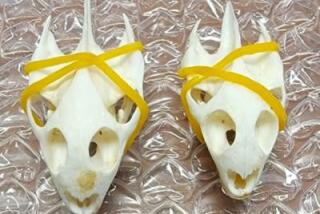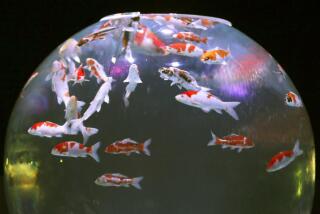Japan Slows Its Import of Some Species : Environment: The nation’s interest in exotic items such as rare fish and reptiles puts new pressures on endangered wildlife, observers say.
- Share via
TOKYO — A national penchant for things foreign and exotic, including odd pets, dulls Japan’s concern for endangered species.
International criticism has forced a gradual halt to imports of some species and animal products banned by international treaties--most recently, two rare types of sea turtles.
But the search for status items like rare fish, reptiles and plants puts new pressures on dwindling wildlife, said Tom Milliken, director of TRAFFIC Japan, which analyzes trade in flora and fauna for the World Wildlife Fund.
After an auto company advertisement showing a frilled lizard running through a desert, frills fluffed out, people asked for the lizards at pet stores.
“It opened an appeal for the bizarre, weird, the icky,” Milliken said.
Reptiles are popular. Young Japanese favor them because apartment leases generally have strict prohibitions on noisier, more demanding pets.
Papua New Guinea, home of frilled lizards, does not permit their export, but sales of green iguanas, pythons and turtles have boomed.
The reptile pet corner on the roof of Tokyo’s Takashimaya department store sells about 200 reptiles and frogs a month.
It stocks all sizes of turtles, salamanders and lizards. Green iguanas stare impassively while baby water dragons bounce frantically off the glass walls of their cubicles.
Milliken said the types of snakes, lizards and fish living in Japanese apartments are not on lists of the most endangered, but that some are vulnerable, especially in a growing market.
Wealthy Japanese also covet rare plants. The popular lady slipper orchid and many other tropical species have disappeared in the wild.
Officials at TRAFFIC say Japan has virtually no controls on trade in animals and plants.
Historically, opposition to restricting imports has been strong.
Japan is one of 110 signatories of the Washington Convention on Trade in Endangered Species, but with reservations that allow trade in six species of whales and two of lizards.
In response to the threat of punitive U.S. trade sanctions, it agreed in May to gradually stop importing two types of endangered sea turtles.
Since the convention took effect in 1980, Japan has imported 748,686 turtles, shells, skins and stuffed specimens, according to government statistics.
Imports of olive ridley turtles have stopped. Hawksbill turtle imports will be reduced to 7 1/2 tons from Aug. 1 until they are prohibited on Dec. 31, 1992, down from a normal 20 tons for an equal period.
Japan was reluctant to ban imports of sea turtles because they are the mainstay of a traditional industry, the making by artisans of tortoise-shell combs, eyeglass frames, bracelets and other ornaments.
The government also resisted a halt to the ivory trade until a world ban took effect at the beginning of 1990. One traditional use of ivory was for engraved seals used in stamping signatures on documents.
More to Read
Sign up for Essential California
The most important California stories and recommendations in your inbox every morning.
You may occasionally receive promotional content from the Los Angeles Times.










